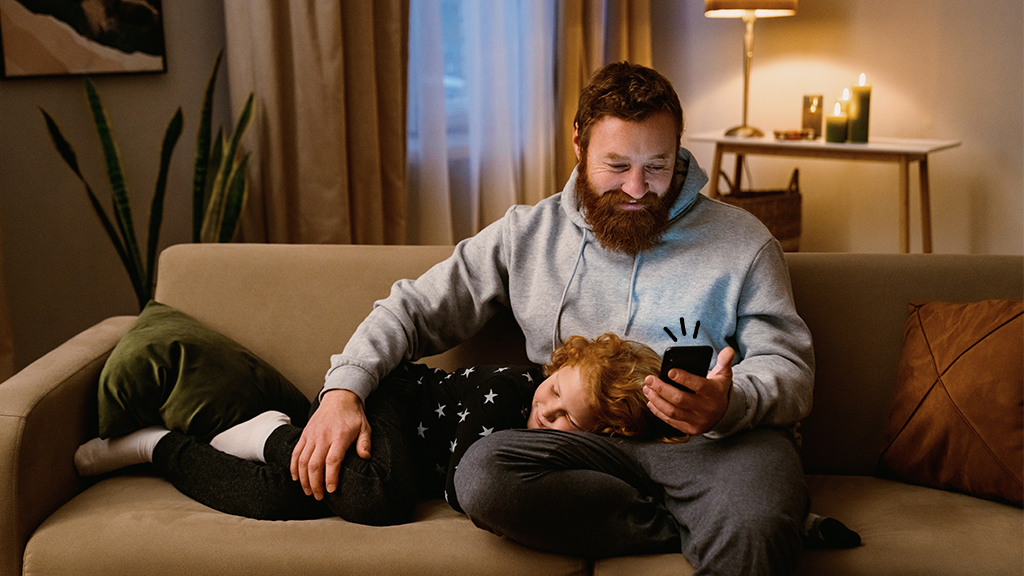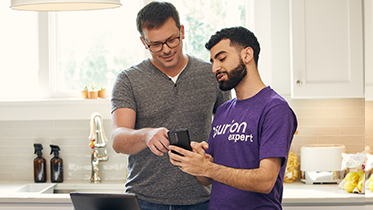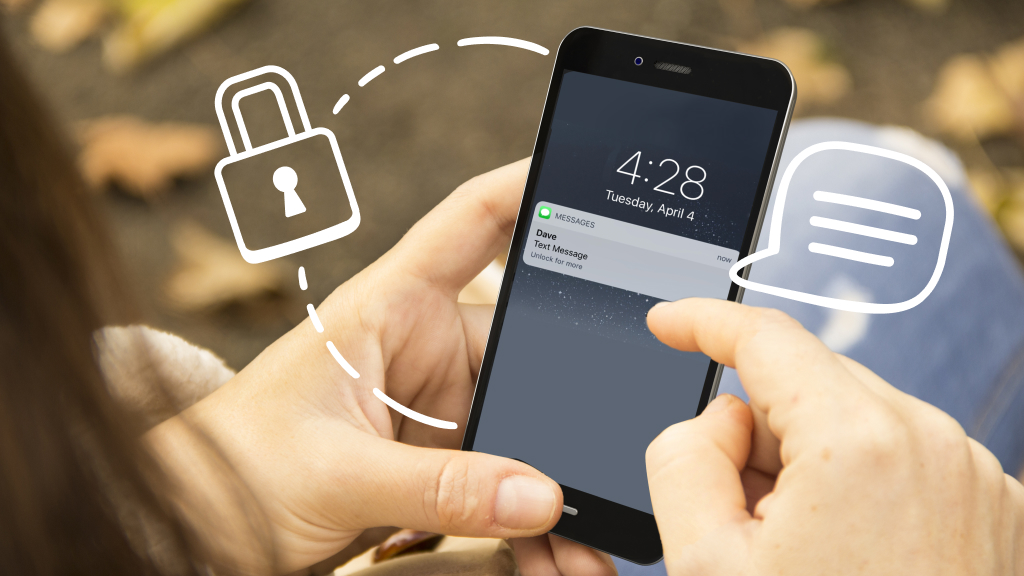Whether you have a teenager, a toddler, or a newborn baby, smart home technology can help you keep an eye on your kids and give you peace of mind. But with so many devices out there, it can be hard to figure out which ones are right for you.
That's where we come in. At Asurion, we take care of you and your tech. Here are the best smart home devices for child safety.
Smart video doorbell
Worried your teenager might sneak out after bedtime? Want to know if someone delivers a package while your middle schooler is home alone? This device is a doorbell and security camera in one. It lets you track who's coming and going from your home, check in via video, and talk with the person at your door through the device's app on your phone.
Using built-in motion sensors, your video doorbell can also record brief clips when someone approaches your front door or porch as well as monitor it live. All this and you don't have to open the door—or even be at home.
Want to install your doorbell on your own? Check out our step-by-step guide. Need help setting it up? Whether you buy video doorbells from popular brands like Ring® or Eufy®, our experts can help.
Smart locks
It's a snowy winter day, and you get a call from your teenage daughter—she just got home from school, but she lost her key. With a traditional lock, you'd have to call a family member, neighbor, or locksmith to open the door. With a smart lock, however, you can help your daughter whether you're at work or out to dinner. All you need is an internet connection and the right app on your phone.
By connecting to Wi-Fi, Bluetooth®, or Z-Wave® technology, smart locks let you unlock or lock your door with an app on your phone, create temporary passcodes, and set up alerts for your door. You can also generate a unique digital key for different people—like a babysitter or piano teacher—and delete those codes whenever you want. And if you leave your teen home alone, your smart lock will alert you if a door is suddenly opened or left unlocked.
Worried about safety? We get it. The good news is that smart locks are absolutely safe. Learn more in our smart lock safety guide.

Psst... Got 2 minutes?
That’s how long it takes to get a care plan personalized for you:
✓ Coverage for thousands of devices ✓ Fast, quality fixes
✓ Hands-on help when you need it
Smart lights
When you have kids, bedtime and early mornings can be dreaded battlegrounds. Either your kids refuse to go to sleep, wake up too early, or sleep so late that they almost miss the school bus. Whatever the challenge, swapping out traditional bulbs for smart lights can help.
With smart lights, you can create a serene bedtime experience by dimming the lights in your child's bedroom at a set time each night. In the morning, program the lights to slowly turn on, signaling that it's time to wake up. Some smart light systems come with motion sensors, so if your child needs to use the bathroom in the middle of the night, the lights can come on as soon as they detect movement.
Have questions about these devices? Not sure how to install them? Learn more by reading our guide to smart lights.
Smart baby monitor
Whether you're sleep training your baby or you have a sick toddler at home, a smart baby monitor can be a lifesaver. There are a lot of options on the market, but look for one that has great sound quality, a clear picture, and batteries that last through the night.
To keep tabs on your child from anywhere—work, a restaurant, the airport—you'll need a smart baby monitor with Wi-Fi, so that it can connect the camera feed to its corresponding app on your phone. A popular choice is the Nanit® Pro Camera. It features full 1080p HD video, temperature and humidity tracking, white noise, and other soothing sounds, as well as two-way audio so you can talk or sing to your child.
If all you're looking to do is keep an eye on your baby while you're at home, consider a device like the Eufy Spaceview or Spaceview Pro, which work when the camera and monitor are nearby one another.
Smart cameras
Smart cameras let you keep an eye on your kids from anywhere. Most brands have similar features, including motion sensors, day and night coverage via HD video, and night vision. Plus they're relatively easy to set up.
Some devices come with cloud video storage (with a monthly or yearly subscription) that gives you access to live or archived video no matter where you are and ensures your footage is safe from fire and device theft or damage. Other devices offer local video storage on an SD card.
From Nest™ to Ring™ to Wyze™ to Blink™, it can be overwhelming to figure out which smart security camera is best for your family's needs. To help you figure out what's best for you, read our guide to the best outdoor and indoor security cameras.
Smart security system
If you're new to smart security systems, they involve placing a few (or many) interconnected devices around your home that work together to protect your space. Most systems include motion sensors (which you can place in hallways and entryways to detect intruders), an entry sensor (which will tell you when a door is opened or closed), and a keypad (which you can use to arm and disarm your system).
But you can also add on a variety of devices, including:
- Window sensors. These devices alert you when a window opens and closes.
- Glass break sensors. These devices go off when they detect the sound of shattering glass.
- Smart smoke and carbon monoxide detectors. By linking to your overall smart home system, these detectors let it alert you—or the proper authorities—if smoke or carbon dioxide is present in your home.
- Smart outdoor lighting. Whether you're trying to ward off strangers or just make it easier to walk up your driveway in the dark, these lights automatically turn on when they sense motion.
Smart security systems are affordable, relatively easy to install, and don't require you to buy a monitoring plan unless you want to. But there are a lot of options on the market. SimpliSafe® The Essentials, Ring Alarm, and Ring Alarm Pro are good places to start, but if you're feeling overwhelmed, here's our guide to everything you need to know about smart home security systems.
Smart thermostat
The temperature of your newborn's room can affect how well they sleep, and sleep is critical to a baby's development (and your sanity). Experts typically recommend a range of 68 to 72 degrees Fahrenheit (20 to 22 degrees Celsius), but how do you keep track of the temperature in your little one's room 24/7 without driving yourself crazy? Try a smart thermostat.
A smart thermostat automatically creates a heating and cooling plan that responds to your preferences, daily schedule, and even the weather. That means you can set the temperature in your baby's room and go to sleep knowing it'll stay steady all night long.
A smart thermostat also helps you conserve energy and save money—about $50 a year, according to the Environmental Protection Agency (EPA). To learn more, here's everything you need to know before switching to a smart thermostat.
Looking for more peace of mind at home? Check out our guide to the best parental control apps to help you keep your kids safe online.
Tech is expensive. Protect it all.
Protect the devices your family loves and relies on with one simple plan. With Asurion Home+®, we cover your computers, TVs, tablets, premium headphones, smart devices, and so much more—plus, 24/7 live support for your tech care needs. Learn more about Asurion Home+® coverage and how you can get peace-of-mind electronics protection.





